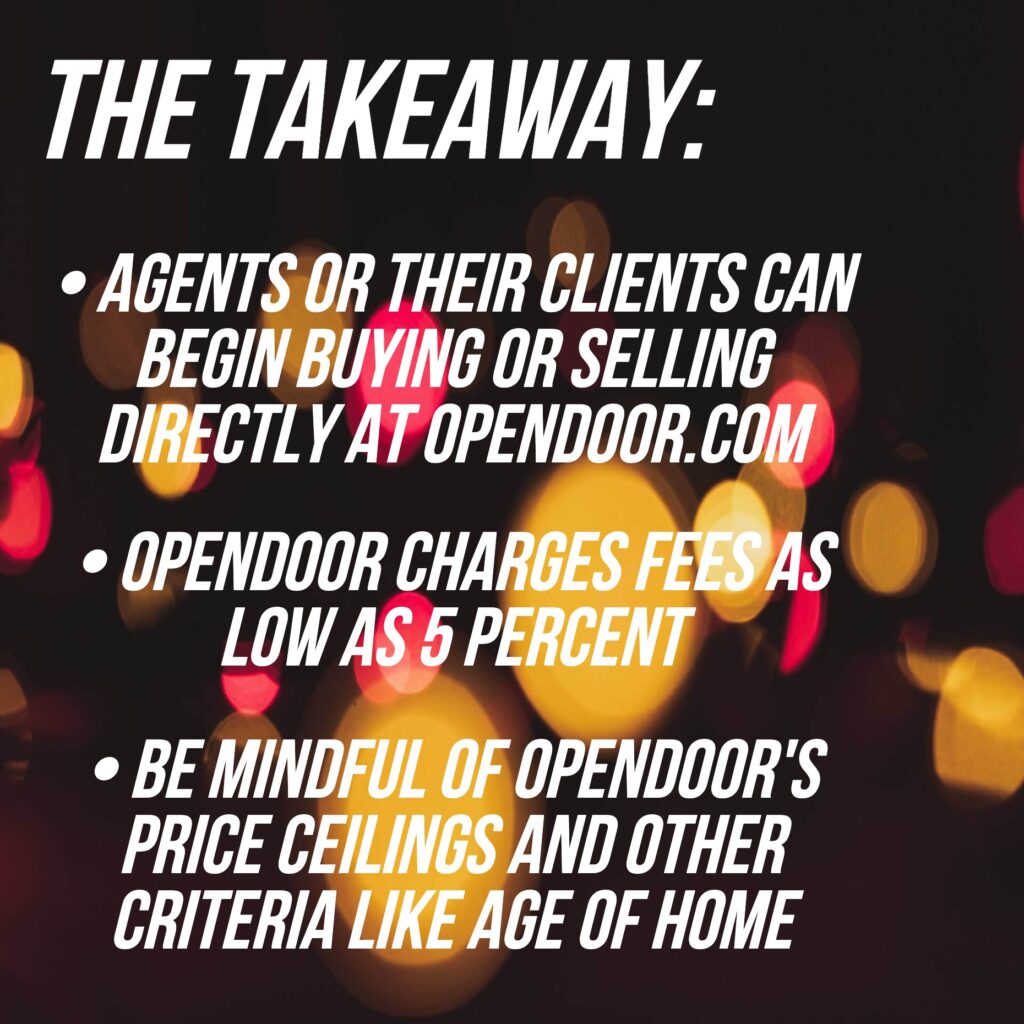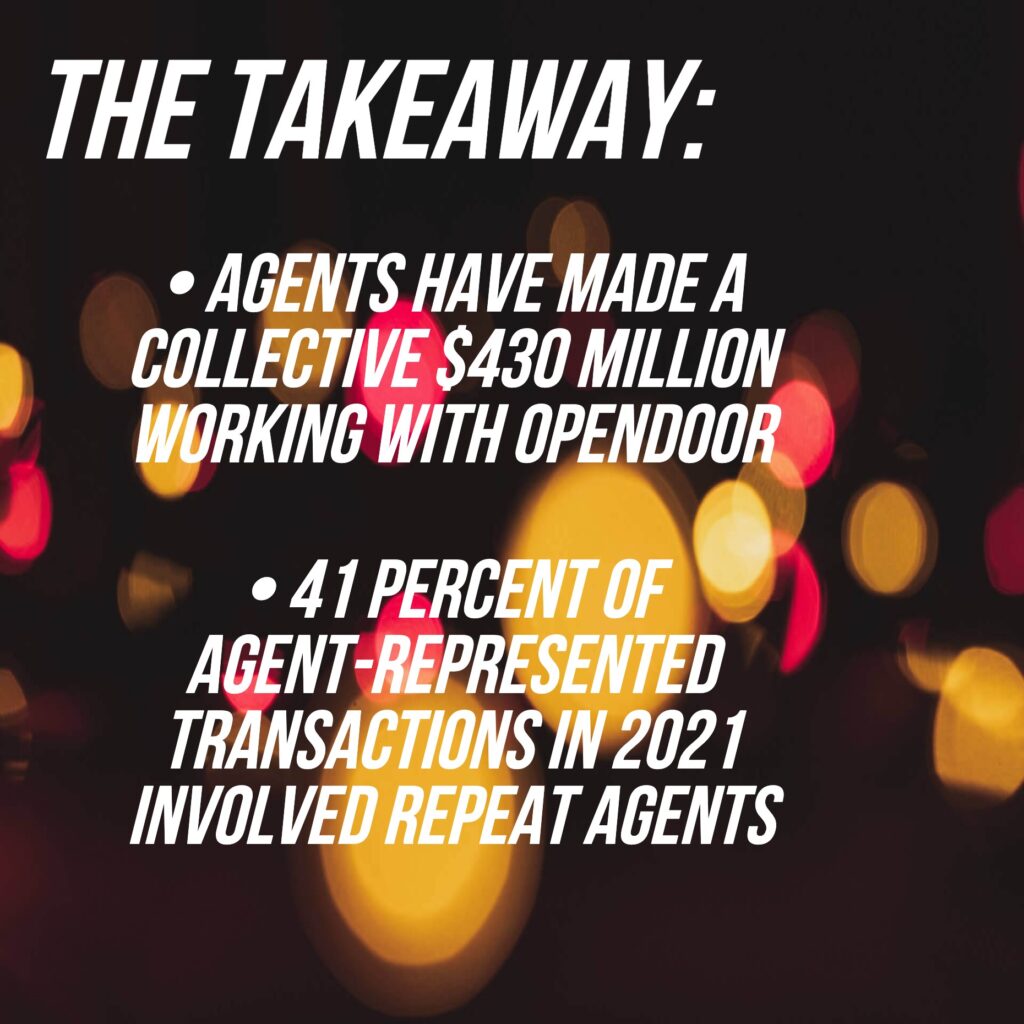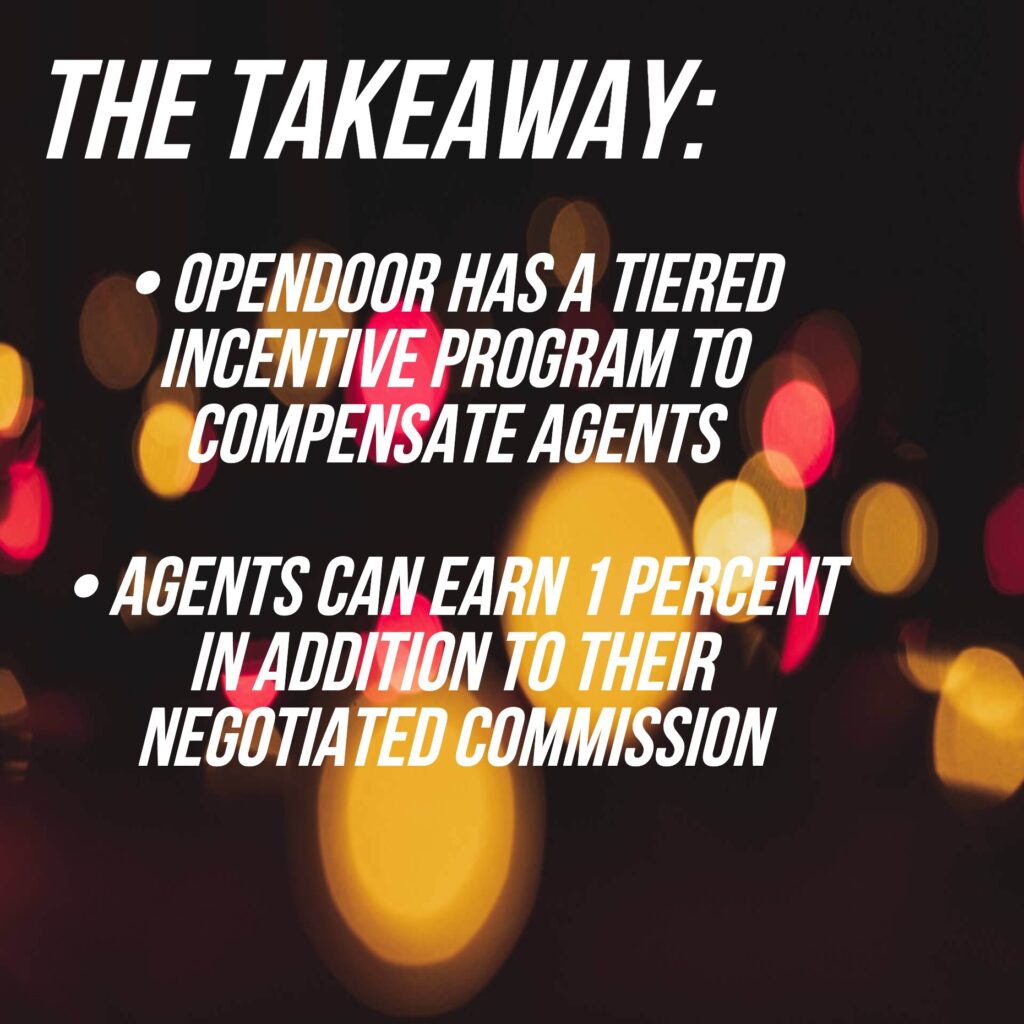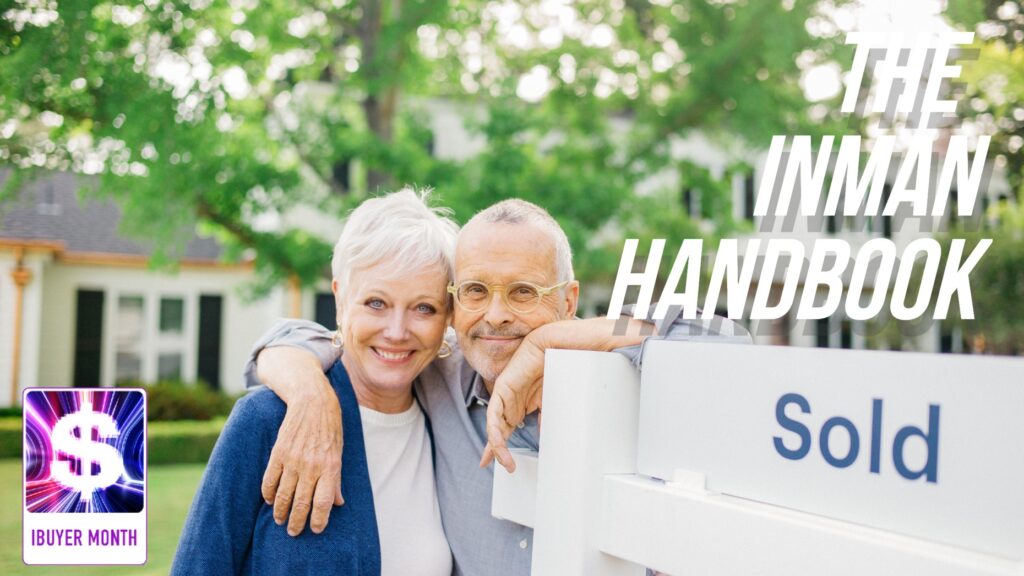This is the second in a four-part series on how agents can get started if they choose to partner with an iBuyer. Check back throughout February as Inman digs into iBuyers to determine what the new year has in store, where opportunities lie for real estate agents and what brokerages should expect. It’s iBuyer Month at Inman.
A full year as a publicly traded company. More than 100,000 total transactions since its founding in 2014. Continued expansion into new markets. If Zillow’s 2021 iBuying collapse acted as a warning about risks in the industry, Opendoor didn’t get the memo.
In the world of iBuyers, Opendoor has worked to establish itself as the leader.
It has emerged as a fast-growing company with a Silicon Valley mindset, doubling its national footprint in 2021 and offering quotes to 1.4 million homeowners looking to sell.
But there are indications that the fast-moving, high-growth instant buyer is cementing its status as a new leader in the world of real estate, one that agents should know how to work with.
“Opendoor is kind of mass-market, we want to get as big as we can as fast as we can, and we want to churn through these houses, as quickly as possible,” said Mike DelPrete, a real estate analyst and iBuying expert.
Its appeal with stock market investors has waned, with shares shedding about 70 percent of their value from a high point last year. While it’s still working to become profitable, Opendoor is still in a better spot than several rivals by a few key metrics.
Zillow famously shuttered its iBuyer program in 2021 after purchasing homes for more than it could sell them for. Offerpad’s stock has plummeted since it went public in the fall of 2021. RedfinNow has a fraction of the number of transactions.
Opendoor accounts for the largest share of overall purchases since 2017, accounting for more than half of all homes purchased by iBuyers in that time, according to CoreLogic.
All that’s to say, Opendoor has emerged from the pack as the preeminent iBuyer, and it has no plans to do anything but continue growing.
The expansion into one of the world’s most competitive housing markets — the market where Opendoor itself is based — was one that officials at the company thought they might never make. It brings its total footprint up to 45 markets as it continues its rapid expansion.
In the third quarter of 2021 the company bought 15,181 homes, a 79 percent increase over the previous quarter, and it sold 5,988 homes, up 72 percent quarter-over-quarter.
With each new market it expands into, it becomes more likely that agents will work with Opendoor sometime in the future. Here’s what they need to know to be prepared.
Table of Contents
Where to start with Opendoor
Opendoor seeks to make buying and selling a home as seamless as possible and offers what it says are several advantages over a traditional listing.
The company says it offers clients four primary benefits: the speed of getting a competitive cash offer and ability to close within two weeks, flexibility on a closing date to avoid a double-mortgage situation, certainty that the deal won’t fall through, and the convenience of selling without having to clean and prep for open houses or showings.
People can buy, sell, tour and get financing in dozens of markets across the U.S.
Agents can head to Opendoor’s website to either make an offer on a home the company is selling or to request an offer from the company.
Selling a home to Opendoor starts at the company’s website, where homeowners can quickly input their address and confirm a few questions about the home that are automatically pulled from public data sources.
When selling to Opendoor, keep in mind its price ceiling and age requirements. In 2021, the company increased the price it’s willing to pay for homes, as well as allowed for older homes. It started buying homes built as early as the 1930s.
Opendoor buys single-family homes and townhomes, as well as duplexes and condos in some markets as long as they’re not in a flood plain. Its typical price range is between $100,000 and $600,000, but the company will go as high as $1.4 million.
Buyers or their agents can browse available Opendoor homes by market or search by address.
Agents can look up the address of an Opendoor home and see whether it has any offers before beginning the offer process. The same page will also state the deadline to submit an offer.
Agents can begin the offer process by downloading the listing packet to obtain information for a client. Through this portal they can also upload the offer and supporting documents and other relevant information about the home.
Opendoor has a cadre of in-house agents who are responsible for transactions in markets across the country. It also has preferred title, escrow and closing attorneys, some of which are corporate affiliates.
The company makes its money by charging a non-negotiable and variable seller fee that starts as low as 5 percent.
Instant buyers have been around for ages — Opendoor is a leading company that says it’s applying the power of the internet to make the process better and easier for customers.
“Opendoor and the iBuyers have been going on for hundreds of years, it’s just been Joe’s iBuyHouses instead of a Wall Street Organization type company,” said Portland-based Realtor Nick Shivers. “The fact is, they pay more money than Joe iBuyHouses, and that is a good thing for the consumers.”

People interested in selling to Opendoor should be mindful of the company’s price ceiling and age restrictions on buying homes.
Additional resources:
What agents and their clients need to know
Opendoor has emerged as an iBuying leader by creating the marketplace and having it revolve around a user-friendly app.
The company says its convenience for buyers makes it another tool for agents looking to help their clients find the best option for their needs.
Will Holmes, general manager of agent growth at Opendoor, pointed to the company’s willingness to let people who sell their homes to Opendoor stay put for up to nine months before moving, offering flexibility for any number of situations, including moving into a newly constructed residence.
For homes with deferred maintenance, Opendoor takes a credit at closing to fund repairs rather than requiring homesellers to shell out for fixes before listing. “A lot of families don’t have that extra money to come out of pocket to get their home show-list ready for the traditional context,” Holmes noted.
Opendoor also helps buyers out with getting pre-qualified for a home loan and allows them to unlock homes they’re interested in for self-guided tours. And while it offers flexibility around closing dates, the company doesn’t currently offer moving services.
With so much focus on the buyer, it may seem like agents are relegated to the backseat — but the company says agents are still at the heart of its business.
All told, agents have collectively earned more than $430 million on commissions through working with Opendoor, the company said.
Agents say they let clients know instant offer programs like Opendoor could be a way to their needs.
Portland-based Realtor Nick Shivers has worked with clients on either side of an Opendoor deal on several occasions.

Nick Shivers | Keller Williams Realty Portland Central
He said he gives his clients an option to work with an instant buyer or move to a traditional list. While working with an instant buyer could mean earning less than what they could make selling through the MLS, it allows his clients to get a good offer and sell quickly.
“There’s a segment of the population that is going to go with my instant offer platform and a segment that should go with a traditional listing,” Shivers said. “And the beautiful thing is people want choices. As an agent, we should be able to come to the table with a lot of different options for them that best fits their needs.”
Opendoor says more agents are bringing the iBuyer into their arsenal, and there’s the data to prove it.
“Over the last year, we’ve seen that an impressive 41 percent of agent-represented transactions (those who represent a seller to Opendoor) have come from repeat agents (those who do two or more transactions),” the company said. For the company, this shows that agents are “embedding us into their process, resulting in a value add, and fundamentally growing their business by working with Opendoor.”
Opendoor is willing to negotiate with buyers’ agents until an agreement is reached, including on final terms and closing costs.
“If new data points arise or a customer/agent feels that something has been overlooked in the offer process, we will work with buyers, sellers, and agents to find a price that’s fair for all parties involved,” the company said.

Key takeaways for agents and their clients working with Opendoor. | Inman
Additional resources:
Agent commissions and benefits
Opendoor says it’s battling “misconceptions” around its value for agents.
Part of that might come from the fact that, according to an investor report covering 2019 transactions, 90 percent of people who sold to the company did so without an agent.
“We understand there have been misconceptions in the past among some in the agent community about the process,” the company said in a statement. “So we aim to provide agents with an abundance of tools and resources to showcase the win-win-win opportunity for buyers, sellers and agents.”
Agents that spoke to Inman said that they’ve recognized Opendoor as another tool that helps them fulfill their fiduciary responsibilities to clients.
“The bottom line for me and my team, my philosophy in life, is if you take care of people you always get taken care of,” Shivers said. “I’m not looking at [how much I’m going to make] when I’m talking to a client. I look at what’s the best choice.”
That being said, agents who close transactions are compensated just as if it were a traditional deal. And they’re incentivized to continue working with Opendoor.
“We are always considering new incentives and resources for agents to grow their business,” the company said. “Our leading program, Agent Access, enables agents to earn their traditional commission plus an additional 1 percent commission on top of that for each seller-represented transaction an agent closes.”
The company also has a tiered incentive program for agents who close deals through Opendoor with a commission plus points system to encourage closed transactions.
Each of the first five transactions nets an agent 1 percent commission. On the fifth transaction, agents earn 100 points plus $5,000. The tiers fluctuate for each subsequent deal.
“That’s really rare in real estate, for the buyer’s side of the transaction to pay the listing side of the transaction for a closing,” said Opendoor’s Holmes. “That does not happen in the normal real estate context. That’s for introducing us to a new seller. Effectively that’s how that function works.”
Agents who have worked with Opendoor say their focus is ensuring clients are taken care of.
Opendoor has representatives across the country, and Shivers said it’s been refreshing to maintain relationships with the same people.
“You think sometimes it goes into this big giant corporation, but I have two people that I have conversations with [at Opendoor],” Shivers said. “Everyone is working for the consumer on that end of it.”

Agents working with Opendoor are incentivized to close more transactions through the company.
Additional resources:
Potential drawbacks
Some of the potential drawbacks of working with Opendoor apply to any iBuyer.
On the one hand, sellers won’t need to take the time to show the house, they won’t need to make repairs and they won’t need to link up with a buyer’s schedule to get out of the house and into a new one. On the other hand, they might make more selling directly on the MLS.
Some fear that companies are accumulating properties with no requirement to list them on the MLS could be taking inventory away from first-time homebuyers in an already record-tight housing market.
Bloomberg reported that thousands of homes once owned by Zillow are being purchased by Wall Street investors rather than individuals, making an already tight market even tighter. And some fear there’s nothing to prevent competing iBuyers from doing the same.
“Opendoor and Offerpad are not required to put their homes on the MLS because they’re not playing by the same rules,” said John Berkowitz, co-founder and CEO of OJO Labs. “Who’s going to find that inventory are the more experienced buyers and sellers. And first-time home owners are going to get kept out.”
In some ways, Zillow’s infamous departure from iBuying has put the remaining leaders under enhanced scrutiny. And while they grow rapidly in scale and number of homes owned, Berkowitz suggested there may be added risk to the companies themselves if they can’t sell homes fast enough.
Opendoor declined to disclose the inventory it currently owns and the average time it takes to sell homes.
Time will tell the viability of the business model in a market where buyers aren’t fighting over scraps of inventory and home prices aren’t appreciating at over 15 percent annually.
The company’s fluctuating fee structure might give it some safety from market downturns.
Opendoor got its footing in the Phoenix metro area and swept across the Sun Belt, generally avoiding the highest-priced markets. That changed in 2021, when the company entered pricier markets and started buying costlier homes. In February 2022, it opened one of the priciest and most competitive in the world: the San Francisco Bay Area.
Opendoor is betting on a strategy of diversification to carry it through any potential widespread market downturn. Company co-founder Keith Rabois gave a glimpse into its strategy.
“Had you been relatively well diversified across all markets in the U.S. you would not have lost money even in 2008,” Rabois said on a podcast in September. “Most U.S. markets do not move in tandem, or historically have not moved in tandem.”
The company plans to expand to more than 100 markets in the future.



 Are You Interested in West Eleventh Residences Miami?
Are You Interested in West Eleventh Residences Miami? Are You Interested in ONE Park Tower by Turnberry?
Are You Interested in ONE Park Tower by Turnberry? Are You Interested in Diesel Wynwood Condominium?
Are You Interested in Diesel Wynwood Condominium? Are You Interested in Five Park Miami Beach?
Are You Interested in Five Park Miami Beach? Are You Interested in Cipriani Residences Miami?
Are You Interested in Cipriani Residences Miami? Are You Interested in Bentley Residences Miami?
Are You Interested in Bentley Residences Miami? Are You Interested in Baccarat Residences Brickell?
Are You Interested in Baccarat Residences Brickell? Are You Interested in Aria Reserve Miami?
Are You Interested in Aria Reserve Miami? Are You Interested in 888 Brickell Dolce & Gabbana | Miami?
Are You Interested in 888 Brickell Dolce & Gabbana | Miami? Are You Interested in 600 Miami WorldCenter?
Are You Interested in 600 Miami WorldCenter? Are You Interested in HUB MIAMI RESIDENCES?
Are You Interested in HUB MIAMI RESIDENCES? Are You Interested in WALDORF ASTORIA RESIDENCES?
Are You Interested in WALDORF ASTORIA RESIDENCES?